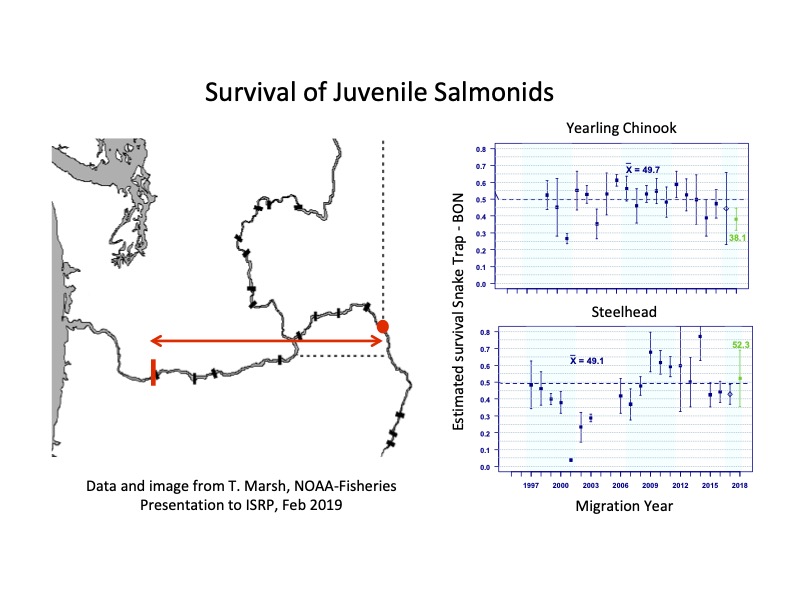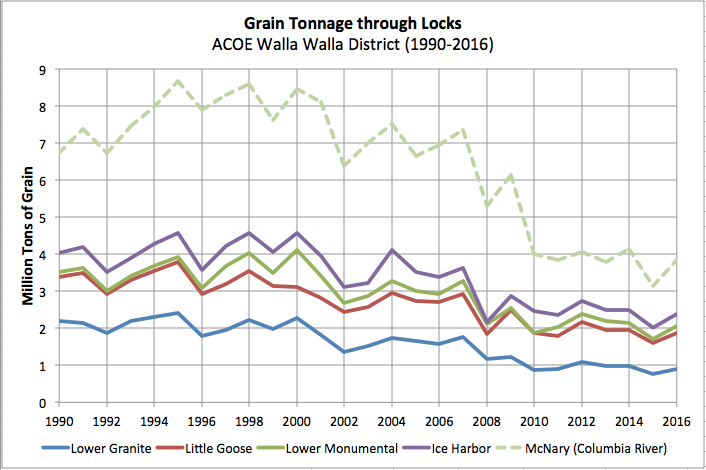forum
library
tutorial
contact

You Can Tell the State What You Think
of Breaching Snake Dams. Take Its Survey
by Annette Cary
Tri-City Herald, November 20, 2019
|
the film forum library tutorial contact |

|
You Can Tell the State What You Think
by Annette Cary
|
 People in Washington state are being asked for their opinions on what would happen if the four lower Snake River dams are taken out.
An online questionnaire is now posted by consultants conducting the state study.
People in Washington state are being asked for their opinions on what would happen if the four lower Snake River dams are taken out.
An online questionnaire is now posted by consultants conducting the state study.
The Legislature, at the request of Gov. Jay Inslee, included $750,000 in the state's budget to hire a neutral third party to investigate the impact if the Eastern Washington dams are removed or breached.
The removal of the dams has been proposed as a way to increase the chinook population that make up the majority of the diet of the declining Southern Resident orca population off the Pacific Coast.
The push to do a study had strong opposition in Eastern Washington, with some residents questioning if the region's concerns and conflicting scientific opinions would be heard over the emotional pleas to save the region's iconic killer whales.
In addition to the online survey, written public comments will be accepted starting when the state's draft study is released, likely in mid-December.
Public meetings to discuss the draft study initially were scheduled in Clarkston, Wash., to represent the east side of the state and in Vancouver, Wash., to represent the west side of the state.
TRI-CITIES MEETING ON SNAKE DAMS
A third meeting was later added within a day of U.S. Rep. Dan Newhouse, R-Wash., and state Sen. Mark Schoesler, R-Ritzville, objecting to Clarkston as the only Eastern Washington session.
The Tri-Cities is the largest populated area near the dams, Schoesler pointed out.
The Tri-Cities meeting is set for 6:30 p.m. Jan. 13 at the Red Lion Hotel in Pasco. It is billed as a chance for people to learn what is in the draft report and hear a panel representing different interests discuss the draft.
It will not be a public hearing to allow the public to comment, but audience members can submit written questions for the study authors and the panel.
To date, the consultants conducting the study have interviewed selected people, including farmers and representatives of ports and utilities.
The public comment period and online questionnaire will give everyone who wants to a chance to weigh in.
The survey remains available until 5 p.m. Jan. 24.
Responses will be treated confidentially, according to consultants.
It focuses on the social, economic and environmental affects of retaining the dams or breaching or removing them.
SURVEY COVERS DAM BENEFITS
It is posted at surveymonkey.com/r/lsrdsurvey.
Among topics it covers are:
More than 1 million acres of wheat were harvested in 2017 in the seven counties adjacent to the Snake River. Wheat and other commodities can be barged on the river, generally at less cost than other ways of transportation, the questionnaire said.
The Ice Harbor Dam reservoir also supports about 37,000 acres of irrigated farmland.

Transportation by barge has fallen below the historical barging use as of 2000. Some forecasts predict continued use at historical levels or increases, according to the questionnaire.
The dams are a carbon-free energy source, producing 1,000 average megawatts of electricity annually and supporting the reliability of the energy system in the Mid-Columbia.
The rapid changes in energy supply and markets could increase or decrease the role of energy provided by the dams, the questionnaire said.
Predictions differ on the benefits to returning fish if the dams are removed.
Predictions range from a fourfold increase in returning salmon and steelhead to a smaller percent increase, according to the questionnaire.
Estimates and perspectives differ on what economic changes breaching the dams would create for area communities and the state.
Economic impacts could result from changes in energy and water supply, shipping, recreation and jobs, the questionnaire said.
The results of the survey and public comments submitted after the draft report is released will be used to inform the governor as he crafts his recommendations to a federal study of the Columbia River Power System.
The federal study, which is required to include breaching dams as an option, was ordered by U.S. Judge Michael Simon in Portland. He has questioned whether enough is being done to improve Northwest salmon runs.
A draft of the federal study is expected to be released in February.
The consultants who are contracted to do the state study are Ross Strategic of Seattle, which has hired subcontractors Kramer Consulting and Anchor QEA, both of Seattle, and White Bluffs Consulting, a two-person Kennewick company.
learn more on topics covered in the film
see the video
read the script
learn the songs
discussion forum
